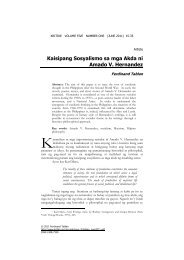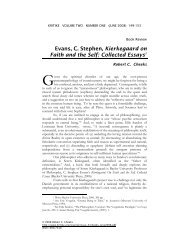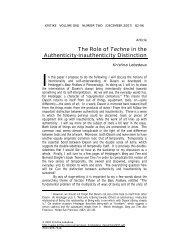Against Alienation: Karol Wojtyla's Theory of Participation
Against Alienation: Karol Wojtyla's Theory of Participation
Against Alienation: Karol Wojtyla's Theory of Participation
You also want an ePaper? Increase the reach of your titles
YUMPU automatically turns print PDFs into web optimized ePapers that Google loves.
80 AGAINST ALIENATION<br />
And<br />
… (participation) basically serves to express the property<br />
by virtue <strong>of</strong> which we as persons exist and act together<br />
with others, while not ceasing to be ourselves or to fulfill<br />
ourselves in action, in our own acts.<br />
…the ability to exist and act together with others in such<br />
a way that in this existing and acting we remain ourselves<br />
and actualize ourselves, which means our own I’s. 31<br />
<strong>Participation</strong> is a positive relation between persons because it allows<br />
the person to experience himself existing and acting together with others.<br />
<strong>Participation</strong> allows the realization <strong>of</strong> oneself as well as the realization <strong>of</strong> the<br />
community. The ability to participate points to the fact that a person can enter<br />
into an interpersonal relationship with other persons and at the same time<br />
fulfill himself in his actions. As the antithesis <strong>of</strong> alienation, participation allows<br />
the person to fully experience himself as well as to experience the humanity <strong>of</strong><br />
other persons. <strong>Participation</strong> points to the fact that human beings (also) tend<br />
toward self-fulfillment and fulfill themselves by existing and acting together<br />
with others. 32 In this sense, the common good and the individual good meet in<br />
the person and he seeks them not alone but together with other persons.<br />
<strong>Participation</strong> is not simply the fact <strong>of</strong> being physically present to one another in<br />
a group activity. It is possible that people exist as a group yet pursue their<br />
goals individually or in isolation. <strong>Participation</strong> points to the positive<br />
recognition <strong>of</strong> the common good by the person. It is not something which<br />
simply happens but is a result <strong>of</strong> a person’s conscious striving for fulfillment<br />
and the realization that he cannot do it alone but must seek it together with<br />
others. In participation, a person does not wish for his good alone but also<br />
wishes the good <strong>of</strong> those that are around him. It allows him to open up<br />
himself to others and also allows others to share their humanity with him. In a<br />
sense, participation allows the person to become more human.<br />
As antithesis to alienation, participation allows the person to maximize<br />
his potential inherent in him as a social creature. <strong>Participation</strong> also opens up a<br />
vast array <strong>of</strong> experiences to the person which will eventually lead him to an<br />
even deeper understanding <strong>of</strong> himself and <strong>of</strong> others. In participation, a person<br />
is called to enter into many different forms <strong>of</strong> interpersonal relations. It makes<br />
it possible for him to experience different roles in their pursuit <strong>of</strong> a common<br />
goal. A good example would be the family – each member is a unique<br />
individual whose position in the family is not something which can be replaced<br />
by anybody. Their difference also accounts for the very dynamic relationship<br />
that occurs within the family. Every member has a task to fulfill which only<br />
31 Wojtyla, Person and Community Selected Essays, 200.<br />
32 Ibid., 254.

















